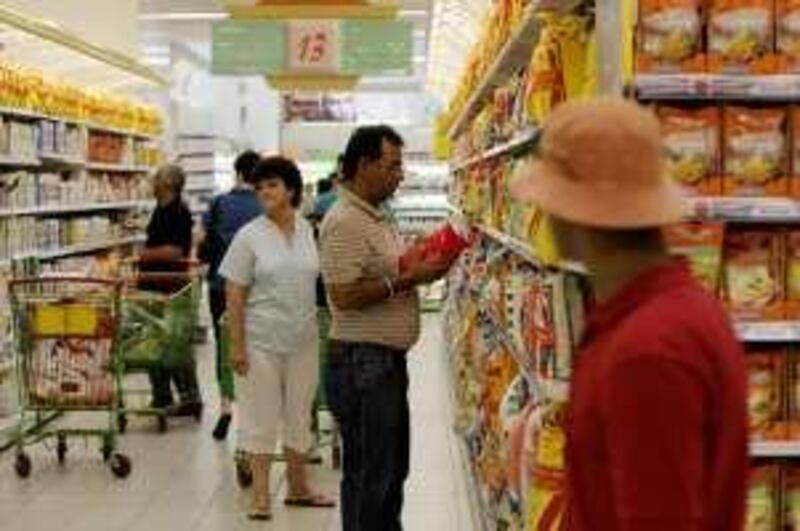DUBAI // A greater awareness of healthy eating is changing the shopping habits of consumers in the UAE and Saudi Arabia. They say they are now more health-conscious when they buy, taking more care to read nutrition labels and seeking out products with health benefits, according to a new survey. They also want food labelling to be much clearer.
Based on 2,000 consumer interviews, split equally between the UAE and Saudi Arabia, the study by the company Datamonitor found that 79 per cent of those surveyed said they placed greater importance on their health than they did two years ago. This is higher than the 75 per cent average of respondents to a similar survey across 17 other countries, including the US, the UK, Russia, Japan and India, said Richard Adams, a Datamonitor analyst and author of the report.
One contributing factor is the serious medical issues that have become more common in the UAE, such as obesity, he said. "There have been a number of serious health issues which have come about in the last few years. "The prevalence of diabetes is quite high; hypertension, cardiovascular disease, these are all seriously prevalent in the UAE." Seventy-three per cent of UAE residents and 57 per cent of Saudi consumers say they are consciously trying to eat healthily most or all of the time, Mr Adams said. Across the other 17 countries Datamonitor surveyed, 61 per cent said they were making a conscious effort to do so.
However, this did not necessarily mean residents in the UAE and Saudi Arabia were eating more healthily, he said. "There is a huge gap between intentions and actions. "They try to eat healthily and consume a small amount of healthy products, and in their minds are eating healthy that day, but if you break down what they consume every day, they're not." Hala Abu-Taha, a nutritionist in Dubai, said she has seen a marked difference in people's attitudes to food and diets in the past year.
Families and individuals now have a better understanding of healthy eating and how to adopt a healthy lifestyle. "People, particularly UAE nationals, used to think that a diet was to 100 per cent eliminate fat and sugar. Nowadays patients are realising that it is not about starvation, it means you take a bit of everything in moderation." The survey also found UAE and Saudi Arabian shoppers looking more closely at product labels, 61 and 56 per cent of them, respectively, saying they use nutritional information written on product packages to make buying decisions all or most of the time.
Globally, just 44 per cent of respondents said they based their food and drink purchases on nutritional labels, said Mr Adams. However, food manufacturers and retailers need to present this information more clearly, he said. Forty-two per cent of UAE respondents and 46 per cent of Saudi consumers found the listed health-related information confusing, compared with 38 per cent globally. "If you can make consumers at a glance clearly see 'this is relatively good for me', these sorts of programmes help consumers understand very quickly the implications of product choices," he said. "And if you can communicate this, customers are much more likely at the point of sale to purchase a product."
Mrs Abu-Taha agreed with the survey results showing people in the UAE are looking more closely at nutritional values. Diseases related to obesity and other metabolic syndromes were now showing up in almost every family at some point, she said, referring to recent figures that showed almost 36 per cent of people in the UAE had diabetes. "Families are much more aware now and they want to change things," she said. "There have been some huge campaigns about healthy eating so people are listening more."
She agreed that food labels needed to be improved to give people more information and choice about what they eat. "A system like the 'traffic lights' showing levels of fat and salt and things would be very helpful here, especially as people want to know more." The Health Authority-Abu Dhabi has previously suggested it may introduce food labels but has not responded to repeated requests for more information. As yet there is no single policy governing how nutritional information should be displayed on foodstuffs.
aligaya@thenational.ae * With additional reporting by Mitya Underwood





